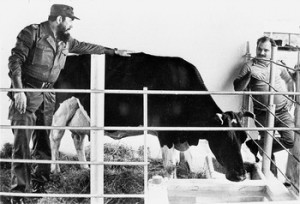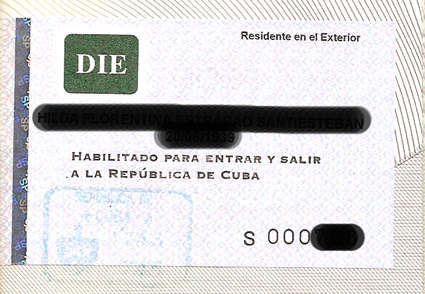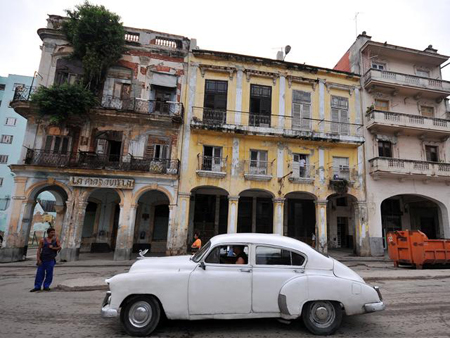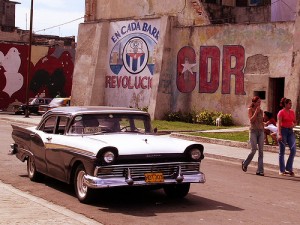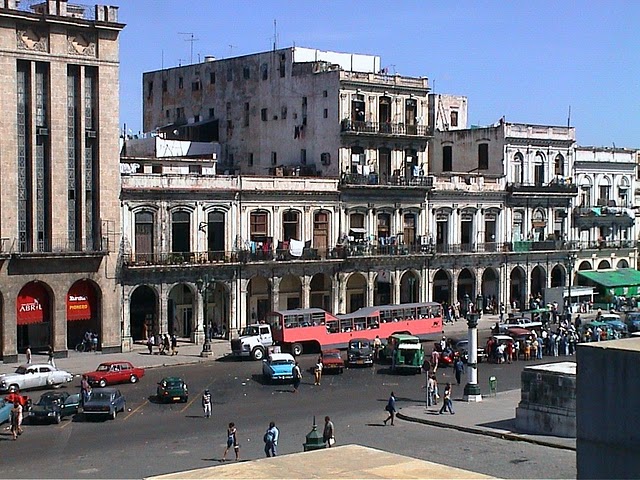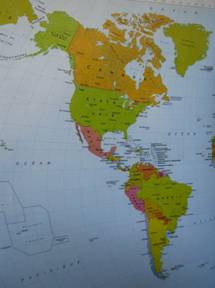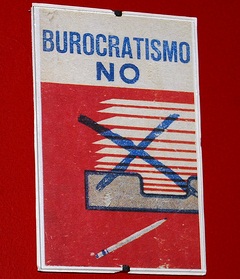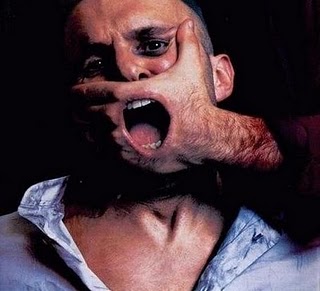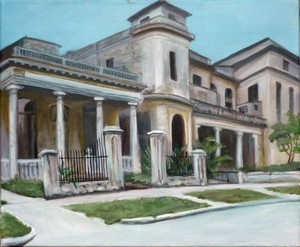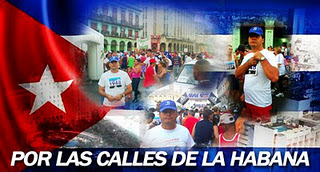
Freedom costs dearly,
and it is necessary either to resign yourself to live without it,
or to decide to pay the price.
José Martí
I have always enjoyed running. It is the supreme moment where literary creation, personal desires and political struggle come together (yes, I definitely have to include this when I talk about personal opinions and the right to self determination). That space where the organism renews its cells, expels fat, where blood flows quickly and removes the residue of cholesterol and triglycerides: I would call it time spent in the office, where work problems are solved and future plans are made. When I practiced at the Martí, the sports field at G and Malecón, when I passed the curve across the street from the Casa de las Americas, I imagined how I would feel on the night of my possible award. I wanted to have an irreverent attitude, and the other three quarters of the track, I continued to prepare the plot of some creation in which I would be immersed.
On the day I won the award, the full staff of cultural officers were assembled on the stage, and I climbed up with my children holding each hand. I was pleased to pass in front of them and leave with an outstretched hand. Everything happened before two thousand people who watched carefully. I remember only approaching a university professor of history who was on the jury and embracing him with admiration. The funny thing is that I remember with more pleasure and clarity the moment when I planned all that running by the curve of the track than I do the night of the award.
Now, when I was ready again to run the 21 km marathon, I felt that I should not do it just for the pleasure that athletics brings. That personal need to exercise should go beyond me, reach other collective purposes (Freedom is not pleasure itself, it should extend to others. José Martí). I needed to defend a national cause. I wanted to run with a sweatshirt that would say so many things. I thought of writing the vocescubanas.com address, GeneraciónY.com, to remember the sacrifice of Orlando Zapata, the Black Spring, something allegorical to the Ladies in White, just to say FREEDOM, to defend the bloggers who proclaim the free right of all Cubans to the Internet, that would criticize censorship, the power of bringing together what each considers most appropriate, necessary and just. Also to remember the stampede of Cuban intellectuals who now live scattered around the world, and the millions of Cubans who have fled the misery, the sacrifice in vain and the bad politics of the Castro family. In particular the 11 rafters of my neighborhood who recently drowned trying to reach Florida. I would like to say so many things. I realized that one T-shirt would not be enough for everything I needed to denounce.
And I called Yoani Sánchez and we agreed to meet at her home. When I explained my wish she didn’t answer. Only after listening to me, she got up to go to her room; when she came back she had a Laura Pollan T-shirt in her hands. Then I realized that this image contained everything it was necessary to scream, demand, display.
I hugged her and Reinaldo and we agreed that on Sunday beginning at 7 am, she would be watching closely to see what would happen to me.
On Sunday I could hardly sleep. Anxiety, as every year happens on the night of the Marabana marathon, tortured me, but this time it was different. I felt a greater responsibility, especially since I barely had time to prepare for the competition. At 5 a.m. I was exercising my muscles. I went to pick up friends, brother Masons that would be watching me at several points along the circuit.
I kept the card with my number on top of Laura’s photo almost until the start. I didn’t want to run the risk that in the midst of the crowd they would drag me away to stop me. Two minutes before the starting signal, I took off the card displaying the number and the photo of Laura Pollan shone like the sun it is. Several young men from military schools immediately realized my intention and spread the word, but now it was too late. With the announcement of the start of the competition, they lost the chance to spoil my plan. And an exciting run began, with convulsive movements, a wave that gained momentum and announced the danger from those pushing behind who wanted to start running, a moment when you can fall down and be trampled in a stampede similar to one by wild horses.
At first you have to be careful not to step on the person in front, or get kicked by those struggling behind. Don’t get carried off by others who pass you, because a bad strategy could put you out of the competition. Keep up the pace; breathing is vital. The professionals are always out front, members of national teams, sports schools, and some badly-placed innocents, who usually end up lying on the edge of the street with scrapes on their knees, elbows and faces from the pushing. It starts at the Capitolio, then down along the Prado, where children are perched on top of the lions.
Two miles later and everyone has their own space. The entrance to the Malecón is the best gift. The vast open sea, dangerous, and I can’t forget the 11 Cubans from Luyano who took to the sea a month ago and disappeared.
An organizer of the event notices Laura’s photo on my chest. Fifteen minutes later, a little white bus with open doors and two men hanging out slowly approaches. When they find me they alert the driver to keep pace with me. I’m afraid they will pull me inside the minibus, and I decide to get near the edge of the Malecón wall and thus prevent them from approaching. Understanding my strategy, they leave. Half an hour later they come back on the same minibus but with a digital camera, and they spend 15 minutes taking my picture with the photo of Laura on my chest. They turn back.
I also saw that to the right they were handing out water and soda, and that several men were suspiciously grouped together, so the possibility existed that they would take me. Then I started running in an S-shape to outrun the minibus and the water delivery points. Yoani Sanchez called me to ask about my state of mind and my safety. So far so good, I answered. “I don’t think they’ll bother you,” she said. “Go on, boy, have strength for the goal. I am here for you. You know, the support is amazing, I saw a picture of you on the Internet, and the number you have on your chest happens to be the year of birth of Laura Pollan (13-2-1948). Good luck.” I did not know what to say. It seemed incredible that her own spirit might have chosen it.
Upon arrival at the restaurant 1830, we no longer saw the sea because we began to enter the city. We climbed the hill of Calle 12 in Vedado, which is the first major test of endurance. When I passed Línea Street, I found an operational unit that tried to hide, pretending they weren’t waiting for me and didn’t notice me, but at the same time, they couldn’t hide the importance or concern I caused them. I looked behind me twice. It seemed to me they had some plan, and I thought that they had aborted it because of the number of people who were in the way. But 100 meters higher up, just at 13th Street, the street where Celia Sánchez lived and where the personal guard of the Castro brothers continues to reside, I discovered that they were waiting for me. Then, frightened and weakened, I took out my cell phone to pretend I was talking while I approached two Canadian marathoners who ran nearby, and I kept them close in case they tried something. I was afraid, of course. But I never had another choice; knowing that at least was encouraging. They seemed undecided, waiting for an order to start the action. As I continued pretending to talk on the phone, I raised my voice, saying that everything was quiet, I was up the hill of 12th and 13th, just at the station of one of the President’s barracks.
It was the tensest minute of my life. They let me go by. But the fear that the slow down was to detain me more easily made me maintain my pace at the top, something that after all I am grateful to them for. From that moment a motorbike stayed behind me. And we turned on 23rd street, and they were waiting by the little bus with cameras in hand. I retreated a few meters. And to reach Jalisco Park we did 10 km; many runners stopped there to comply with the registration distance. Manuel Fernández called me from Madrid to say “Brother, we are aware of what might happen to you, you are not alone.” My sister Mary called from Miami, scared because of what might happen to me. “Nothing worse than living without freedom,” I answered her.
We followed 23rd to 26th Street, where we turned toward la Ciudad Deportiva, Sports City. At this part of the circuit the marathoners performed the “cachumbambé” because of the many curves and hills. From this point an ambulance kept close to me. From its interior several men looked at me and smiled cynically. I ignored them. The motorbike remained behind.
As we began the ascent of the hill from the zoo, my legs began to waver for the first time. A pain went up from my ankle as if they had introduced a cold screw into my blood. I was ashamed of being unable to go on. And a voice said, “Don’t weaken; Laura’s spirit is with you. Let her carry you to the goal.” I looked, and there was a sweet old man who wanted to say hello. I tried to smile but don’t know if I succeeded. I only remember that my strength came back, and the screw in my ankle began to recede. And I felt a hymn inside me. I imagined Laura Pollán walking beside me with her gladiola fastened to her chest. My eyes got teary. And that force continued to emerge from the depths of my being, an explosion of light struggling in my veins. My legs began to stretch out, the muscles relaxed, and an organizer told me when I passed by the Calzada del Cerro and 26th that I was keeping up a good pace.
In the following segments of the race, several “civilians” who looked like security forces were waiting on the sidewalk, and some took photos as proof with their cameras or cell phones. The siege of the microbus was more sporadic. When we arrived at Carlos III, I felt close to the goal, although there were still a few kilometers. Several friends called me, concerned and supportive, from Miami, including the writers Daniel Morales, Zilmar from Spain, Gume Pacheco, Torralbas, Amir from Panama. Lilo Vilaplana called from Colombia to yell that he was proud of me, of being my brother.
Passing by the building of the Grand Lodge I was greeted by some Masons who didn’t understand what I was doing. Immersed in exhaustion, I experienced transcendental moments over the history of the institution. I raised my arm in a sign of happy celebration.
Going down Reina St., a woman told me that Laura looked prettier than ever. I touched her photo on my T-shirt, which was completely wet. I continued the descent, and my personal energy bulb flickered. Brotherhood Park seemed beautiful as never before. “Come on, you made it,” they shouted at me. “You brought it home like the Virgin, la Caridad del Cobre, the mambisa virgin,” said another. Some congratulated me. And all that cheered me up. Although I still worried about the end, if they were waiting to arrest me, but really now it was not important. Which meant that the fear had passed. My body was worthless; I had run at least a distance of 21 km. Radio Martí asked me a question, and I even had the strength to express that I was paying tribute to Laura Pollán, trying to cry out for a FREE CUBA.
The last meters are the worst. Imagined emotion is frustrated by fatigue. When I pass the goal, a doctor asks me if I need assistance. I say no. I get the medal. And they tell me to walk through a dark corridor that intersects the many-sided Kid Chocolate Sports Hall. I pretend I’m going to enter and break through the lobby of the Payret cinema and escape.
My friends were waiting for me. We sat in Central Park at the foot of José Martí, and I read the text I kept in my pocket.
A son of Cuba I am, I bind myself to her,
a powerful fate, impossible to overcome;
with her I go; inevitably I follow,
down a path that is horrible or pleasant,
With her I go without hindrance or hobbles,
biting the yoke or vibrating with vengeance.
With her I shall go while the slave weeps,
With her I shall go when she sings freely.
José Jacinto Milanés
(Letter sent from José Jacinto Milanés to the Mexican poet Ignacio Rodríguez Galván)
Footnote:
That same Sunday of the marathon, in the afternoon, State Security visited my home. But two years ago I decided to abandon it when they began the first “acts of repudiation” in front of my house. I sought shelter in different places. I’m an itinerant, with a laptop and a toothbrush. Since then I never sleep a week in the same place. Always when they cite me or arrest me they insist on the exact location I spend the night. And I show them the address on my identity card. After Sunday they have been looking for me at my girlfriend’s and two other places I usually visit. So far they have been unable to find me. Before they arrest me I at least need to finish a post to repudiate the regime and expose its atrocious dictatorship.
But they can’t stand the news that I’ve never been happier.
Ángel Santiesteban-Prats
Translated by Regina Anavy
December 1 2011

 The Cuban dictatorship criticizes the possibility offered by the U.S. government of accepting Cubans who cross the Florida Straits in a bid to achieve their dreams. They write lengthy manifestos to disguise the reality of the island, and blame the ones who suffer the problem. Which means looking at the result and forgetting the cause.
The Cuban dictatorship criticizes the possibility offered by the U.S. government of accepting Cubans who cross the Florida Straits in a bid to achieve their dreams. They write lengthy manifestos to disguise the reality of the island, and blame the ones who suffer the problem. Which means looking at the result and forgetting the cause.